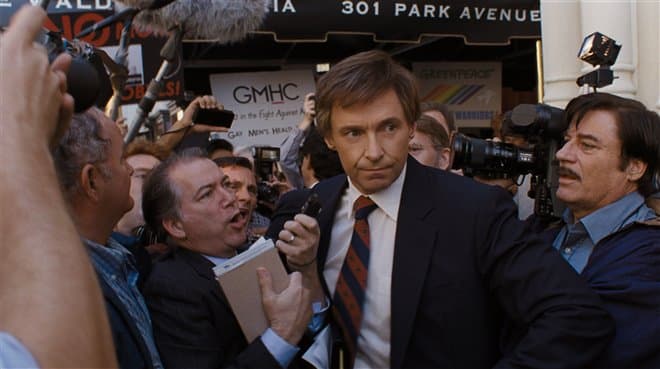By Lisa Kennedy, for Denverite
When it opens in Denver Friday, "The Front Runner" will have been stumping for weeks. The political drama, starring Hugh Jackman, made whistle stops at the Telluride and Toronto film fests. Last week, the movie about the implosion of Colorado Sen. Gary Hart's 1988 presidential campaign received a Denver Film Festival red-carpet presentation at the Ellie Caulkins Opera House.
It was the perfect place. After all, Hart's star rose in the Rocky Mountain west. And his relative youth and pragmatic interest in tech were notable long before the Denver-Boulder corridor became a startup haven.
That evening, director Jason Reitman and moderator Maximillian Potter were joined on stage for a post-screening chat by producer Helen Eastabrook and co-writers Jay Carson and Matt Bai. Carson boasts a slew of bona fides as a political strategist, speech writer and press secretary. (He was Hilary Clinton's 2008 campaign press secretary.) Bai wrote the book on which the movie is based: "The Truth is Out There: The Week Politics Went Tabloid."
That's an impressive amount of insider know-how. A good thing, too. Because "The Front Runner" frustrates in ways that could only be mitigated by a conversation about bringing the smart and savvy book to the screen. Otherwise you're in for a film that seems to repeat the very mistakes Bai's book points out so well.
"The Front Runner" is a star-driven tale when the gnarlier story is the one about the ongoing tango between culture and journalism. Hart's downfall should provide plenty of "how did we all get here?" lessons. Additionally, the movie could have proved a tonic to the too glorifying images of the Fourth Estate in the recent -- far better -- movies "Spotlight" and "The Paper." But "The Front Runner" doesn't quite live up to its promise, not unlike its tarnished protagonist.
Hugh Jackman gives a moody, watchable performance as the candidate whose intellectual confidence and emotional aloofness often flummoxed the press. J.K. Simmons makes believable the disappointment Hart's campaign manager must have felt. And a pack of younguns recognizable to indie film watchers make up his hungry campaign staff.
Vera Farmiga brings a quiet awareness to Lee, Hart's wife then and now. It's something of a thankless task meant to convey so much about marriage when the movie shouldn't really be about that. The couple still live in Colorado.
In early 1988, while his campaign was going gangbusters, Hart took a break from the crush and made a trip on a boat called the Monkey Business with an iffy campaign operative and two women, one a former model named Donna Rice. Hart has always insisted that they didn't have an affair, after the Miami Herald staked out his Georgetown townhouse and got shots of him and Rice.
Bai's book argues nimbly that the campaign's cratering was the result of seismic shifts occurring in journalism at the time. Some of those changes were wrought by the increasingly crowded field of celebrity-chasing. In the movie, someone from the Hart campaign complains about "Us Weekly." (Is it worth mentioning -- given the movie's points about fact versus gossip -- that the celeb-driven mag didn't become a weekly until the late '90s?)
Other changes had to do with what happened to political journalism in the wake of Watergate. Bob Woodward and Carl Bernstein became stars for work that brought down the Nixon administration. Heck, the Washington Post duo were played by two of moviedom's blazing stars -- Robert Redford and Dustin Hoffman- in "All the President's Men." Young reporters became keen to topple corrupt political figures -- to look under rocks if need be.
Hart was adhering to the old rules when he got prickly with reporters about the sanctity of his private life. (The rules of yore had protected the extra-marital jaunts of LBJ and JFK, to name only two wayward leaders.) The print press was torn on how to compete with TV and tabloids.
It's a subtle turning point when a Miami Herald reporter asks for some time with the candidate on a flight and is told there won't be any interviews, only to see the Washington Post scribe (Mamoudou Athie plays the composite character) sit next to Hart.
Hell hath no fury like a journalist scorned? Not quite. The snub didn't send the reporter back to Miami with an axe to grind. But it may have made it easier for him to listen when a clandestine call came about Hart, Rice and some photos.
Later, as things unravel for Hart, he tries to rise above the muck. He reasons, feints, then castigates the press about the high road. His chiding exacerbates the situation until he has to pull out of the race a second time.
While Hart went on to do admirable -- even vital -- work on international security, his political persona never recovered. Which might strike some as lunatic, given our current state of affairs. No pun intended.
Columbia Pictures has a couple of posters for "The Front Runner." One features Jackman in the backseat of a car, the media hounds visible through the window. The other is an illustration of a campaign bus driving off a cliff.
The first underscores what's wrong with the movie: It panders to the market's need for stars. The latter teases the best insights of Bai's book -- the ones we should be wrestling with even now, especially now. We got a film about the downfall of a politician, whose flaws didn't outweigh his promise. What we needed was the one about how a candidate and the press headed off that precipice -- and took us with them.
Correction: This story originally misidentified the film's production company.

Onetime film and theater critic for the Denver Post, Lisa Kennedy continues to brave the intersection of popular culture and lived culture. Sometimes against the light. She's written for the New York Times, Newsday, CNN.com, Essence and American Theatre mag. Follow her on Twitter and Facebook: @bylisakennedy













